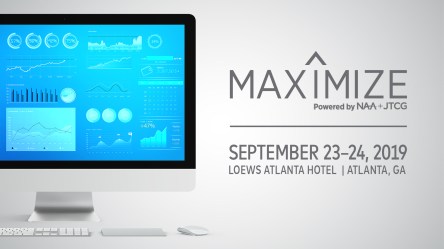Are you thinking about fine tuning your revenue management program to meet the challenges of COVID-19? The current market is impacting demand and pricing, and it’s time to consider new strategies for managing your assets with both a short- and long-term focus on collections and occupancy. As some states are already planning to open up within phased approach guidelines, Yardi Matrix data shows that demand is bouncing back from an initial drop of about 30% during the first two weeks of March. Plus, move-outs have slowed down. Looking at data collected from 11.5 million apartment units, April collections were better than expected according to the NMHC Rent Payment Tracker which showed 84% of apartment households made full or partial rent payments by April 12 and 91.5% by April 26. While that’s good news, the coming months are a bit unpredictable due to growing unemployment and delays for many people in getting their benefit payments. “It is encouraging that apartment residents continue to meet their rent obligations whether that’s with the support of the federal relief funds, credit cards and alternative, flexible options provided by the industry’s owners and operators,” said NMHC President Doug Bibby. “But their financial security is unclear as many may not qualify for federal relief, while others are drawing down savings and facing greater financial challenges, including higher health care costs. For that reason, lawmakers need to act now to enact a direct renter assistance program.”* One growing trend is undeniable: leasing has shifted online, so be ready to handle more virtual traffic to your properties. Your revenue management strategy should adapt smartly to these changes in demand and interactions. Many initially thought a lockdown on rental pricing increases made sense but could be a knee-jerk reaction. There’s more to...
Downturn Ready?
Tips from NAA Maximize
At Maximize powered by NAA, the annual conference dedicated to asset and revenue management and long-term value creation for apartment portfolios, industry pros talked about how changes in the economy — including an expected downturn ahead — will impact multifamily revenue management. This year’s sessions covered renovations and amenities in some detail, with panelists speaking about the importance of flexible strategies when navigating changing markets. For example, there might be less demand than anticipated for high-end renovations. Conversations also turned to smart home technology including self-showing programs, and short-term rentals as a new revenue stream that would be increasingly compelling in struggling rental markets. While some attendees have only known growth, experienced revenue managers who maneuvered through the last recession shared tactics and valuable lessons learned. Although it’s unclear exactly when the next downturn will happen, the consensus at Maximize was it will happen. And the sooner you’re ready for it, the better. Curveballs ahead So how do you prepare for a downturn? Experts agree that having a well-informed revenue management strategy in place is crucial, and that means having tools to collect data to uncover trends and follow patterns in order to make smart decisions. Beyond finding the sweet spot for rental pricing, auditing your properties for other ways to boost performance is also a great idea — including assessing amenities and reducing unnecessary expenses. In addition to knowing how to price units based on inventory and market conditions, the most effective revenue managers also know every selling point of each property in their portfolio. With the advent of artificial intelligence and machine learning to guide asset management, sometimes the computer knows what’s happening before people do. In times of both growth and recession, the most successful revenue managers will be using a...
Recession-Proof Properties...
Get Strategies at Maximize
As we head into uncertain economic times, is your multifamily portfolio recession proof? Now more than ever, you need data you can trust and a smart revenue management strategy to set competitive rental prices, maximize occupancy and spend marketing dollars wisely. And, with the arrival of artificial intelligence and machine learning to inform business intelligence, computers understand what is happening in the market before people do. In a July 2019 Forbes article, “Three Ways to Recession-Proof Multifamily Properties,” the author stated “Just as ‘all politics is local,’ so is real estate. In their Beige Book, the Federal Reserve governors said real estate activity is declining in some regions even as others pick up the pace. Much of that activity centers on multifamily real estate: 319,000 apartments are due for completion this year nationwide, which the Wall Street Journal determined is the most new units in about three decades. Local conditions should dictate new multifamily purchases and impact investors’ efforts to recession-proof already-owned properties.” Come for Answers So, how do you drive property performance in a changing industry? Join us at Maximize 2019 for some great answers — NAA’s premier event taking place on September 23-24 in Atlanta. This year’s conference will focus on the intersection of asset and revenue management and will deliver knowledge and tactics that attendees can put into action. Educational sessions include the must-attend “Revenue Management and the Recession” on September 24 at 10:00 a.m., moderated by Dhar Sawh, industry principal of revenue management at Yardi. Sawh will be joined by panelists Trey Lane, vice president of pricing and revenue management at Progress Residential, Michael Lilly, director of revenue management at Weidner Property Management and Jessica Mills, senior consultant at D2 Demand Solutions. Attendees will discover what experienced pricing managers learned during the last recession and...
Optimizing Data
Maximizing Revenue Part 2
Yesterday, we laid the foundations of a strong online presence. We now continue with how to gather insights from analytics to inform marketing and retention decisions. Micro-Adjustments Lead to Success When vacancy rates inch upward, resist the urge to slash prices. “Price should be the last negotiable item, not the first,” advises Sawh. Examine your SEM data, which will show leads generated and which keywords drive conversions. Use that information to adjust pay-per-click ads, the easiest marketing factor to manipulate. In a case study, Bell needed to fill several 2-bedroom units. Data revealed that people who visited the website’s Pets page were most likely to reach goal completion. The team marketed 2-bedroom units to pet lovers to successfully fill the units. You can also make adjustments based on prospects’ objections to visits and objections to leasing. Leverage Soft Data “Business intelligence tools can give you a purview in but it doesn’t tell you the story. Customer insight is the soft data, the human touch,” says Weaver. SEO and SEM generate traffic but once traffic is translated into website and site visits, ORM and customer relationship management (CRM) capture data about visitors. Both give insights into why visitors chose to lease (or not) with your property. Use data gleaned from ORM to tweak the resident and prospect experience. If several reviews indicate that the marketing doesn’t match the product, for example, it’s time to update your gallery and re-examine your marketing message. With prospects, poor follow-through lets many conversions slip away. “It will take eight times of someone telling you no before they say yes,” explains Norbury. “Three points of contact aren’t enough.” “What we tend to forget is that we paid, maybe $20, for the phone to ring. If we don’t answer or don’t...
Maximize Revenue
Use Data Better
The National Apartment Association (NAA) recently hosted the 2017 Education Conference in Atlanta. Marketing Maneuvers: Data in the Driver’s Seat explores how data can inform marketing decision and maximize revenue. Panelists included Candace Weaver, Director of Marketing, Bell Partners; Diana Norbury, Vice President, Multifamily Operations, Pillar Properties; and moderator Dharmendra Sawh, Industry Principal, Revenue Management and Business Intelligence Sales at Yardi. The trio reinforces the importance of operations, revenue management, and marketing working together to reach goals. Below are three takeaways from the session: Understand the “Magic Mix” Before you can gather data, four key components must be in place to generate web-based data sets: SEO– search engine optimization is how your site is written to interact well with search engines. If you don’t have this solid foundation, you’ll have to work harder and spend more on SEM. Quality SEO contributes to higher organic rankings. SEM– search engine marketing includes paid search features. It is second best to organic rankings. “In one of our properties, there were an average 497 organic views but an average 690 views with paid search. Paid search will boost you but you can’t do SEM well without SEO,” explains Weaver. SEM comes with unique benefits as well. In one Bell case study, only 23 percent of leads came from SEM yet those leads made up 43 percent of total conversions. ORM -online reputation management entails how your brand is perceived online. This includes but is not limited to reviews and comments on your site and third party sites. Both Norbury and Weaver recommend having designated reputation management teams. “Of the 2 percent of people that click ‘Reviews’ on our property website, they have a 46 percent chance of converting,” says Weaver. SMO- social media optimization may overlap with ORM...
NAA Approaches
Join Yardi for great sessions
It’s one of the industry’s most-anticipated conferences of the year. Yardi is proud to be a sponsor of the National Apartment Association’s annual Education Conference and Expo, taking place June 24-26 at the Mandalay Bay Resort and Convention Center in Las Vegas. NAA offers attendees to experience the latest innovation in the apartment industry, from best practices for business, to marketing strategy, to new on-site ideas. The takeaways are extensive and the opportunity to learn is limited only by the number of hours in the day. As you’re planning your conference schedule, here are a few sessions that should definitely land on the “don’t miss this list.” “Let’s Get Engaged! 7 Tips to Build Resident Relationships that Last” Technology Booth #2505, Friday, 6/26 1:00-2:00pm Esther Bonardi, Yardi Apartment All Star Esther Bonardi is an industry expert on digital apartment marketing, and retaining residents is one of her specialties. You won’t want to miss her insight on advertising, lead tracking, social media, online search, and much more. “Putting Research to Work: Understand Customers & Outperform the Market” Thursday, 6/25 11:30am – 12:30pm Jack Kern, Multi-Housing News Want to be able to read the minds of your renters? In this session, Multi-Housing News and Commercial Property Executive publisher Jack Kern will outline useful practices to help understand how and why renters make the choices they do, and explain how customer-centric property research can benefit your business. “Pricing to Win: Using Revenue Management to Sign More Leases” Friday, 6/26 9:00 AM – 10:00 AM Ian Mattingly, CPM, LumaCorp Inc. Tammy Atkins, CPM, Heritage Apartments Shannon Hayden, Epoch Management, Inc. Mark Haldi, Bridge Property Management This exceptional panel of apartment industry peers will focus on the magic of revenue management. If you have ever wondered about how this...
Revenue Management
Tips from the experts
When you implement a revenue management system, it will change staff roles and how internal data is analyzed and put to use. To be prepared for operational change and minimize disruption, it’s important to have a solid implementation strategy in place pre-launch. Organization-wide training on a new revenue management system is a vital means of empowering your staff to better connect with residents and colleagues. One key reason for having a training strategy in place has to do with the typical turnover experienced in the real estate industry. If the property is running smoothly because the current staff knows the system but then new hires arrive, you must be nimble enough to train new employees quickly and ensure their understanding of the software is thorough. As Jennifer van Arcken, director of information systems for BSR Trust LLC, pointed out, “There are a lot of parameters to set up on each property and if something gets changed then it might not be giving you the right response.” In short, the onsite team needs to know it is okay to pick up the phone and call their manager with concerns. Not only do managers and staff need to appreciate the system, but they also must know how to sell the pricing to prospects. Prior to the establishment of revenue management systems, renters were sold on the bottom line. Now the question that matters is “When do you want to move in?” Prospects may be surprised at first when presented with lower longer-term rates based on an earlier move-in time frame. And they’ll hopefully be incentivized to sign a lease to start almost immediately, even if they still need to vacate a former unit. Your prospects are savvier now, they understand how airlines and hotels operate and...







